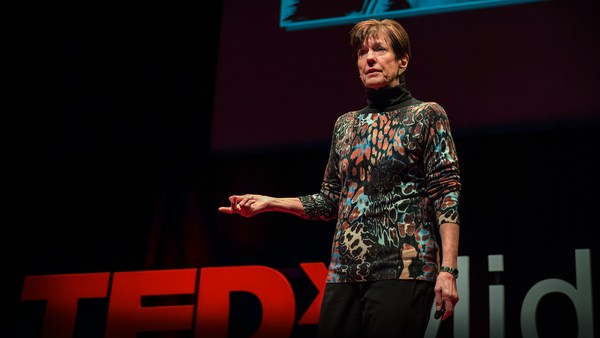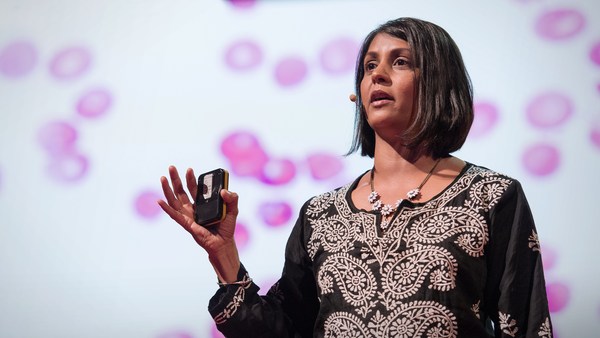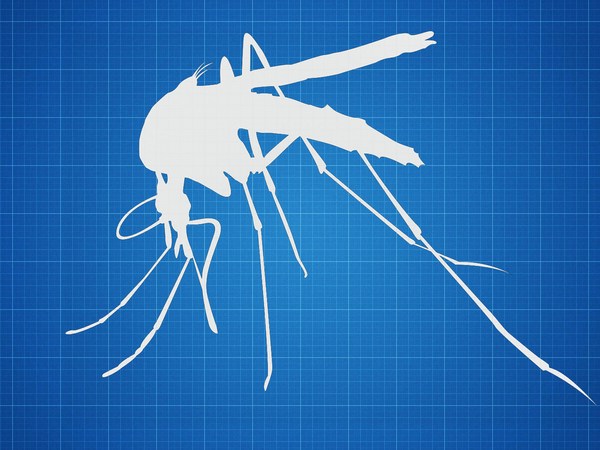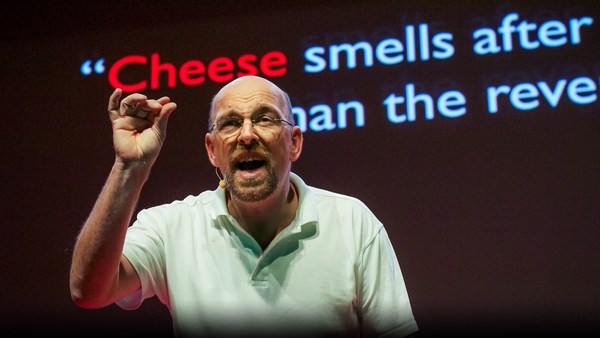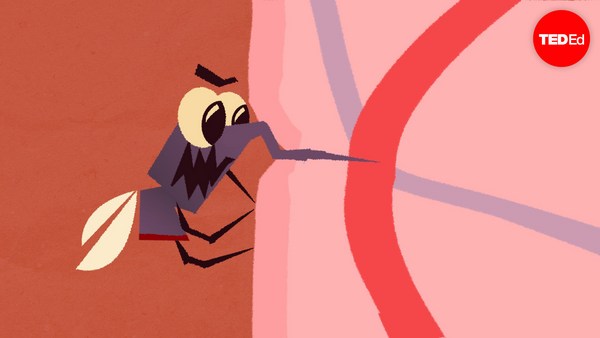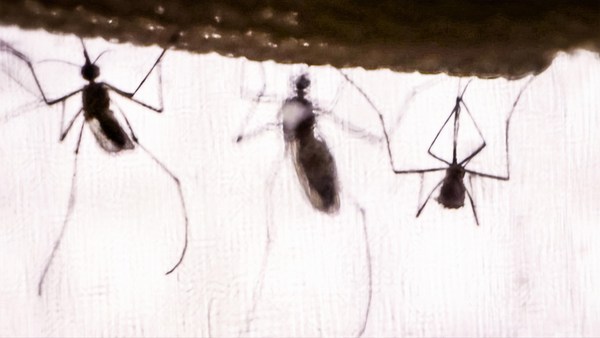I guess because I'm from Tanzania I have a responsibility to welcome all of you once again. Thank you for coming.
So, first of all, before we start, how many of you in the audience have been in the past a victim of this bug here? We apologize on behalf of all the mosquito catchers.
(Laughter)
Ladies and gentlemen, imagine getting seven infectious mosquito bites every day. That's 2,555 infectious bites every year. When I was in college, I moved to the Kilombero River valley in the southeastern part of Tanzania. This is historically one of the most malarious zones in the world at that time. Life here was difficult. In its later stages malaria manifested with extreme seizures locally known as degedege. It's killed both women and men, adults and children, without mercy.
My home institution, Ifakara Health Institute, began in this valley in the 1950s to address priority health needs for the local communities. In fact, the name Ifakara refers to a place you go to die, which is a reflection of what life used to be here in the days before organized public health care. When I first moved here, my primary role was to estimate how much malaria transmission was going on across the villages and which mosquitoes were transmitting the disease.
So my colleague and myself came 30 kilometers south of Ifakara town across the river. Every evening we went into the villages with flashlights and siphons. We rolled up our trousers, and waited for mosquitoes that were coming to bite us so we could collect them to check if they were carrying malaria.
(Laughter)
My colleague and myself selected a household, and we started inside and outside, swapping positions every half hour. And we did this for 12 hours every night for 24 consecutive nights. We slept for four hours every morning and worked the rest of the day, sorting mosquitoes, identifying them and chopping off their heads so they could be analyzed in the lab to check if they were carrying malaria parasites in their blood mouthparts. This way we were able to not only know how much malaria was going on here but also which mosquitoes were carrying this malaria. We were also able to know whether malaria was mostly inside houses or outside houses.
Today, ladies and gentlemen, I still catch mosquitoes for a living. But I do this mostly to improve people's lives and well-being. This has been called by some people the most dangerous animal on earth -- which unfortunately is true. But what do we really know about mosquitoes? It turns out we actually know very little. Consider the fact that at the moment our best practice against malaria are bednets -- insecticide treated bednets. We know now that across Africa you have widespread resistance to insecticides. And these are the same insecticides, the pyrethroid class, that are put on these bednets. We know now that these bednets protect you from bites but only minimally kill the mosquitoes that they should. What it means is that we've got to do more to be able to get to zero. And that's part of our duty.
At Ifakara Health Institute we focus very much on the biology of the mosquito, and we try to do this so we can identify new opportunities. A new approach. New ways to try and get new options that we can use together with things such as bednets to be able to get to zero. And I'm going to share with you a few examples of the things that my colleagues and myself do.
Take this, for example. Mosquitoes breed in small pools of water. Not all of them are easy to find -- they can be scattered across villages, they can be as small as hoofprints. They can be behind your house or far from your house. And so, if you wanted to control mosquito larvae, it can actually be quite difficult to get them. What my colleagues and I have decided to do is to think about what if we used mosquitoes themselves to carry the insecticides from a place of our choice to their own breeding habitats so that whichever eggs they lay there shall not survive.
This is Dickson Lwetoijera. This is my colleague who runs this show at Ifakara. And he has demonstrated cleverly that you can actually get mosquitoes to come to the place where they normally come to get blood to pick up a dose of sterilants or insecticide, carry this back to their own breeding habitat and kill all their progeny. And we have demonstrated that you can do this and crush populations very, very rapidly. This is beautiful.
This is our mosquito city. It is the largest mosquito farm available in the world for malaria research. Here we have large-scale self-sustaining colonies of malaria mosquitoes that we rear in these facilities. Of course, they are disease-free. But what these systems allow us to do is to introduce new tools and test them immediately, very quickly, and see if we can crush these populations or control them in some way. And my colleagues have demonstrated that if you just put two or three positions where mosquitoes can go pick up these lethal substances, we can crush these colonies in just three months. That's autodissemination, as we call it.
But what if we could use the mosquitoes' sexual behavior to also control them? So, first of all I would like to tell you that actually mosquitoes mate in what we call swarms. Male mosquitoes usually congregate in clusters around the horizon, usually after sunset. The males go there for a dance, the females fly into that dance and select a male mosquito of their choice, usually the best-looking male in their view. They clump together and fall down onto the floor. If you watch this, it's beautiful. It's a fantastic phenomenon. This is where our mosquito-catching work gets really interesting. What we have seen, when we go swarm hunting in the villages, is that these swarm locations tend to be at exactly the same location every day, every week, every month, year in, year out. They start at exactly the same time of the evening, and they are at exactly the same locations. What does this tell us? It means that if we can map all these locations across villages, we could actually crush these populations by just a single blow. Kind of, you know, bomb-spray them or nuke them out. And that is what we try to do with young men and women across the villages. We organize these crews, teach them how to identify the swarms, and spray them out. My colleagues and I believe we have a new window to get mosquitoes out of the valley.
But perhaps the fact that mosquitoes eat blood, human blood, is the reason they are the most dangerous animal on earth. But think about it this way -- mosquitoes actually smell you. And they have developed incredible sensory organs. They can smell from as far sometimes as 100 meters away. And when they get closer, they can even tell the difference between two family members. They know who you are based on what you produce from your breath, skin, sweat and body odor. What we have done at Ifakara is to identify what it is in your skin, your body, your sweat or your breath that these mosquitoes like. Once we identified these substances, we created a concoction, kind of a mixture, a blend of synthetic substances that are reminiscent of what you produce from your body. And we made a synthetic blend that was attracting three to five times more mosquitoes than a human being. What can you do with this? You put in a trap, lure a lot of mosquitoes and you kill them, right? And of course, you can also use it for surveillance. At Ifakara we wish to expand our knowledge on the biology of the mosquito; to control many other diseases, including, of course, the malaria, but also those other diseases that mosquitoes transmit like dengue, Chikungunya and Zika virus. And this is why my colleagues, for example -- we have looked at the fact that some mosquitoes like to bite you on the leg region. And we've now created these mosquito repellent sandals that tourists and locals can wear when they're coming. And you don't get bitten -- this gives you 'round the clock protection until the time you go under your bednet.
(Applause)
My love-hate relationship with mosquitoes continues.
(Laughter)
And it's going to go a long way, I can see. But that's OK. WHO has set a goal of 2030 to eliminate malaria from 35 countries. The African Union has set a goal of 2030 to eliminate malaria from the continent. At Ifakara we are firmly behind these goals. And we've put together a cohort of young scientists, male and female, who are champions, who are interested in coming together to make this vision come true. They do what they can to make it work. And we are supporting them. We are here to make sure that these dreams come true.
Ladies and gentlemen, even if it doesn't happen in our lifetime, even if it doesn't happen before you and me go away, I believe that your child and my child shall inherit a world free of malaria transmitting mosquitoes and free of malaria. Thank you very much, ladies and gentlemen.
(Applause)
Thank you.
Kelo Kubu: OK, Fredros. Let's talk about CRISPR for a bit.
(Laughter)
It's taken the world by storm, it promises to do amazing things. What do you think of scientists using CRISPR to kill off mosquitoes?
Fredros Okumu: To answer this question, let's start from what the problem is. First of all, we're talking about a disease that still kills -- according to the latest figures we have from WHO -- 429,000 people. Most of these are African children. Of course, we've made progress, there are countries that have achieved up to 50-60 percent reduction in malaria burden. But we still have to do more to get to zero. There is already proof of principle that gene-editing techniques, such as CRISPR, can be used effectively to transform mosquitoes so that either they do not transmit malaria -- we call this population alteration -- or that they no longer exist, population suppression. This is already proven in the lab.
There is also modeling work that has demonstrated that even if you were to release just a small number of these genetically modified mosquitoes, that you can actually achieve elimination very, very quickly. So, CRISPR and tools like this offer us some real opportunities -- real-life opportunities to have high-impact interventions that we can use in addition to what we have now to eventually go to zero. This is important. Now, of course people always ask us -- which is a common question, I guess you're going to ask this as well -- "What happens if you eliminate mosquitoes?"
KK: I won't ask then, you answer.
FO: OK. In respect to this, I would just like to remind my colleagues that we have 3,500 mosquito species in this world. Maybe more than that. About 400 of these are Anophelenes, and only about 70 of them have any capacity to transmit malaria. In Africa, we're having to deal with three or four of these as the major guys. They carry most -- like 99 percent of all the malaria we have. If we were to go out with gene editing like CRISPR, if we were to go out with gene drives to control malaria, we would be going after only one or two. I don't see a diversity problem with that. But that's personal view. I think it's OK. And remember, by the way, all these years we've been trying to eliminate these mosquitoes effectively by spraying them -- our colleagues in America have sprayed with -- really bomb-spraying these insects out of the villages. In Africa we do a lot of household spraying. All these are aimed solely at killing the mosquitoes. So there's really no problem if we had a new tool.
But having said that, I have to say we also have to be very, very responsible here. So there's the regulatory side, and we have to partner with our regulators and make sure that everything that we do is done correctly, is done responsibly and that we also have to do independent risk assessments, to just make sure that all these processes do not fall into the wrong hands. Thank you very much.
KK: Thank you.
(Applause)
